[ad_1]
Estimated reading time: 12 minutes
You’ve outfitted your homestead with a garden, stockpiles of food, fortified windows, and the ultimate backyard BBQ area. Your kingdom is almost complete! There is only one thing missing: your four-legged friend!
A house isn’t a home without companionship, especially when you have kids around. When it comes to selecting a pup that is going to be with your family for 10+ years, consider carefully. Just like there isn’t one style of homesteading, there isn’t a one-dog-fits-all for homesteaders. Make a checklist of what it is you’re looking for in a furry friend and stick to it.
Article continues below.
As for most homesteaders, there are a few jobs to fill on the farm. Here is a list of the best dog breeds to fill the most commonly desired pup positions…
Want to save this post for later? Click Here to Pin It on Pinterest!
Security Dogs
A security dog is different from an attack dog, just like a security guard at the mall is different from an NYPD officer. These dogs are meant more for alerting you about an intruder, rather than taking the problem into their own paws.
1. Bernese Mountain Dog
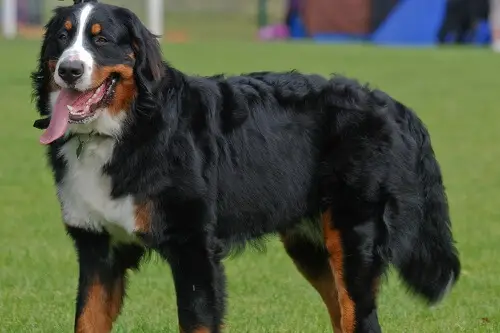
Bernese Mountain Dogs are known to be fantastic watchdogs as their bark is deep and fierce while their heart is extremely loyal to their owner.
Temperament: Bernese Mountain Dogs love cuddle time with their owner and prefer not to be alone. They are very affectionate and wonderful with kids.
Downfalls: Compared to other dog breeds, Bernese Mountain Dogs have a relatively short lifespan at around 6-8 years old.
Energy Level: These dogs have a mellow energy level and will spend their day lounging around the house or following you on walks around the property.
2. Great Dane
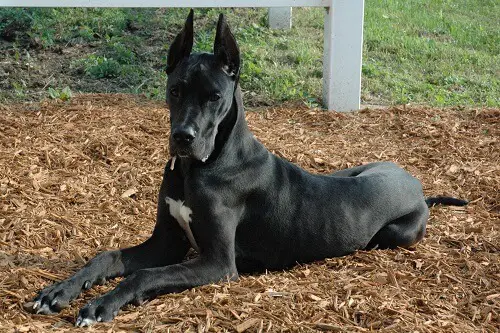
The sight and sound of a massive Great Dane are enough to make unwelcome humans and animals turn and run for the hills. Great Danes are not known for being aggressive, so you won’t have to worry about your pup chasing after an intruder (or a raccoon).
Temperament: These high-energy dogs would absolutely love some children around to play with. They may look intimidating, but they are extremely sweet and gentle creatures.
Downfalls: Great Danes don’t seem to be aware of their size, so they tend to be clumsy in smaller spaces, often knocking things over as they play.
Energy Level: Great Danes are relatively high energy and need lots of space to stretch those long legs of theirs. Once they’ve had a few good runs or walks, they are perfectly content to curl up with you on the couch after a long day.
3. Rhodesian Ridgeback
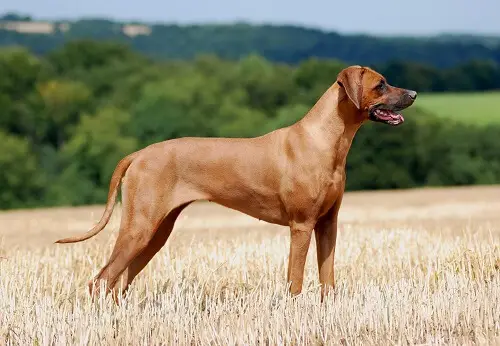
Muscular and yet lean, the athletic Rhodesian Ridgeback was the result of Dutch settlers in southern Africa breeding dogs made for hunting and protecting hunting camps. All the same, these dogs could just as easily protect your homestead as well.
Temperament: The Ridgeback is a protective dog that bonds very closely to its adoptive family and has a desire to please its owners. Your Ridgeback will need to live indoors with your family rather than live outside permanently.
Downfalls: The Ridgeback can become aggressive when he is not given enough exercise or attention from the family.
Energy Level: The Ridgeback is a very high energy dog that requires much physical stimulation. While they’ll need to live indoors with your family to be close with everyone, they’ll also require a lot of exercise and running outdoors. These dogs will be a natural fit for a homestead with plenty of space outside.
Protection Dogs
If you want a dog who is going to go to battle for you against intruders, looters, and zombies, you’re going to want a dog that is fiercely loyal and easy to train, intimidating and courageous. Here are three contenders.
4. Bullmastiff
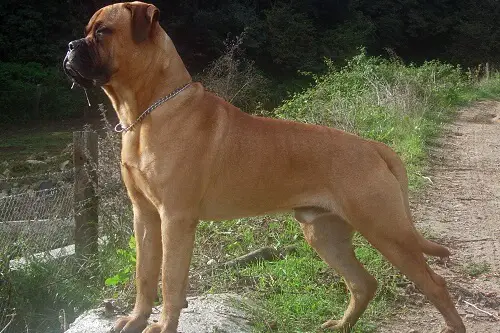
Big and brave enough to handle intruders, yet sweet and cuddly enough to show lots of affection to their family, a Bullmastiff ticks all the boxes when it comes to serving as the family guardian.
Temperament: While Bullmastiffs are mellow, sociable and great with kids, they are extremely loyal and will go to great lengths to protect their family.
Downfalls: These dogs don’t immediately get along with other dogs, unless those dogs are already part of the family.
Energy Level: Bullmastiffs have a relatively low energy level but will certainly jump to their feet when it comes time to handle an intruder. That being said, they do well on smaller plots of property.
5. German Shepherd
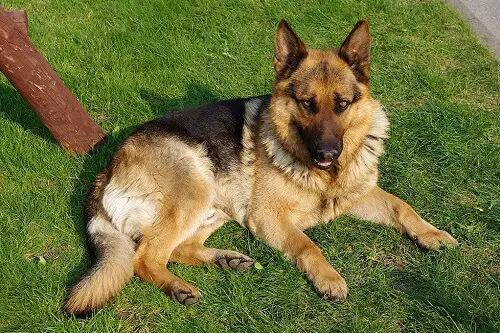
Originally herding dogs, German Shepherds are most famously in the spotlight for being fantastic police dogs. Thanks to their keen intellect, German Shepherds are easy to train, including to attack intruders.
Temperament: These intellectual dogs love mental stimulation. Play with them, take them to training classes, or run with them at home. They love to spend time with their owners.
Downfalls: German Shepherds like to dig and chew when they get bored!
Energy Level: German Shepherds are athletic and active so they require lots of space to run, or you’re going to come home to your couch cushions in shreds.
6. Rottweiler
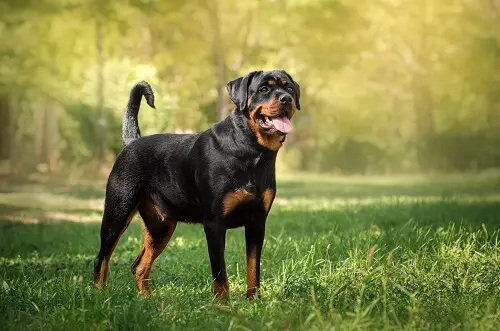
The distinctive-looking Rottweiler is a great homestead protection dog. While laid back and gentle around children and its family, the Rottweiler will become alert and very territorial when it perceives a threat. When the Rottweiler barks, you know something is wrong.
Temperament: A Rottweiler that’s been raised with a firm hand will be very calm and gentle around your family, but also confident and alert around strangers.
Downfalls: Rottweilers are known for suffering from a variety of potential health issues, including eye diseases (such as cataracts) and hip dysplasia.
Energy Level: Rottweilers are a medium energy dog. They’ll need a good workout at least once daily, but otherwise they’ll be perfectly happy being quiet and reserved while in your family’s house.
Livestock Assistance
7. Australian Shepherd
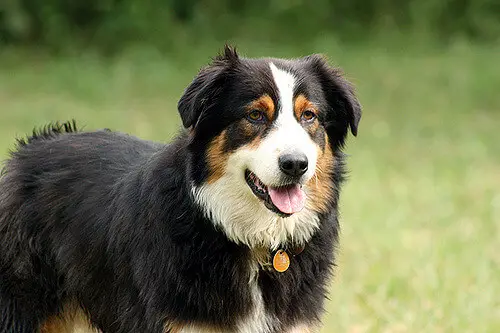
Got cattle, sheep, horses, or ducks on the homestead? Need help during your daily rounds to bring the cattle in and out of the pasture? Look no further than the Australian Shepherd.
Temperament: These super affectionate dogs are eager to please, and thus keen to learn your commands. Australian Shepherds are also famous for being great horse-rodeo dogs!
Downfalls: Australian Shepherds need constant space to run around and play!
Energy Level: Despite being such high-energy dogs, Australian Shepherds are able to intently focus while herding. They will work by your side for hours on end and are quite good at their job.
8. Great Pyrenees
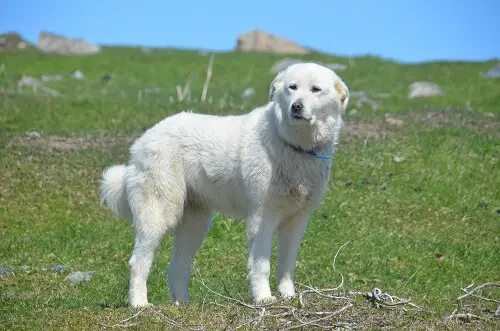
The white and fluffy Great Pyrenees were born from the beginning for one purpose: to watch and protect livestock. These dogs can spend hours upon hours watching your sheep or other animals without moving so much as a muscle, and then suddenly spring into defensive action when a threat has appeared. Your Great Pyrenees will serve as a loyal, watchful, and protective guardian of your homestead.
Temperament: The Great Pyrenees can be best described as a gentle giant when around your family. While these dogs are massive and are born with an innate instinct to protect livestock, they are also incredibly patient, mellow, and quiet around their human families.
But when threats appear, such as wolves or coyotes, the Pyrenees will become fierce and savage in its never ending mission to protect its flock.
Downfalls: The Great Pyrenees require a significant amount of outdoor space to thrive in. These are not the best choice for an indoor dog. The breed is also prone to hip-related disorders such as hip dysplasia.
Energy Level: The Pyrenees is a calm dog breed that’s happy to do its own thing protecting your animals and keeping an eye on your property. It won’t thrive when its kept indoors for too long, however.
9. Kuvasz
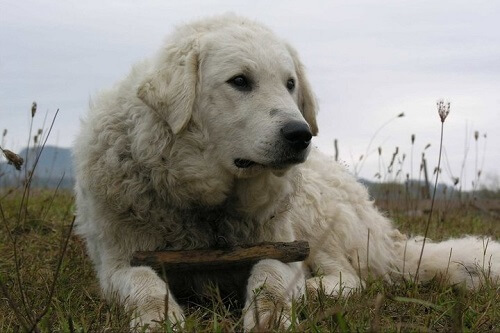
Pronounced Ku-Vaz, these fluffy polar-bear looking animals are uniquely fit to serve as homestead helpers. Kuvasz pups can be trained to watch over livestock and protect them against predators.
Temperament: These homestead dogs are quite aloof and independent. They will wander the property all day on their own, keeping an eye out.
Downfalls: Kuvasz pups aren’t the most social and don’t do too well with children climbing all over them.
Energy Level: These high-energy dogs are said to be able to run 15 miles without tiring. In other words, they need a large piece of land to wander and will be on guard round’ the clock.
Hunting Dogs
These next three dog breeds will come as no surprise in regards to hunting–it’s in their blood! Better yet, these dogs are extremely family friendly and make for the perfect companion on the homestead.
10. Coonhound
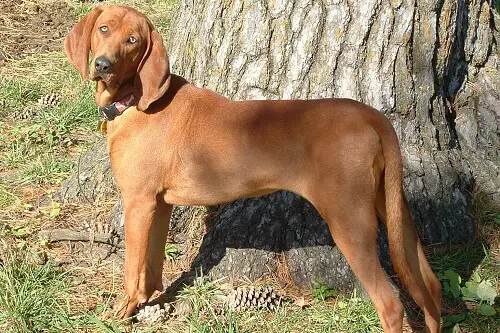
Athletic enough to take on varied terrain, outfitted with an intense nose for tracking, easy to train, persistent in the chase, Coonhounds make for great hunting partners. From raccoons to foxes, the Coonhound is always ready for the games to begin.
Temperament: Coonhounds are sociable animals that love meeting new people and even new dogs. Take them anywhere with their tail wagging!
Downfalls: Coonhounds need lots of love and attention. Leaving them alone for too long can cause doggy depression.
Energy Level: The high energy level of a Coonhound makes them excellent runners known for their speed and endurance. They’ll happily join you on an all-day hunting expedition.
11. English Pointer
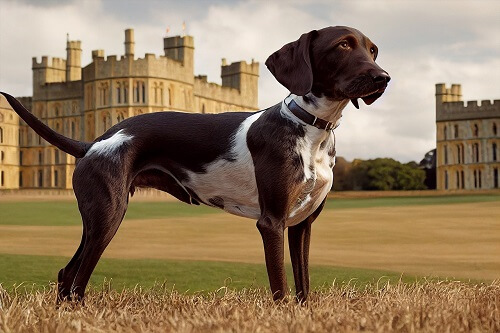
The English Pointer, also sometimes just referred to as the ‘Pointer,’ is a bird hunting dog that is known for its determination and high prey drive. If you want a dog that can vigorously go after pheasants or quail, the Pointer should be on your short list.
Temperament: The Pointer is very alert and good-natured, if also a little stubborn. You can expect your Pointer to be friendly around your family while also consistently being eager for outdoor play.
Downfalls: The Pointer is known for a strong independent streak that makes puppy training a challenge.
Energy Level: The Pointer is a very active breed that requires constant physical exercise to ensure they are kept happy. Plan on at least one good walk or play session per day.
12. Labrador Retriever
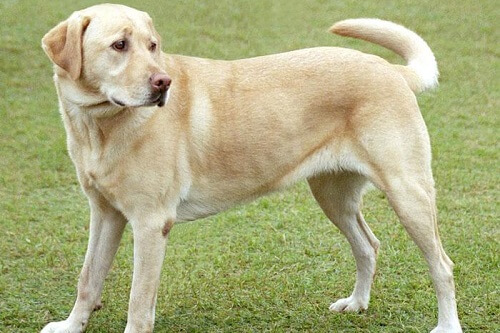
Some of the best four-legged swimmers on the planet are Labrador Retrievers. This makes them excellent hunters when it comes to fetching foul and small game in watery territory.
Temperament: Labradors are known for being some of the sweetest, most affectionate and playful dog breeds that have ever existed! They are rarely aggressive and do very well with strangers.
Downfalls: Labs are gluttonous creatures and would eat all day if they had the chance. That being said, it’s important to pay attention to their diet in order to keep them at a healthy weight.
Energy Level: High-energy labs always want to play fetch, go hunting, or run around. However, you don’t need to worry about annoying or incessant barking.
Final Thoughts
When searching for a breeder, take your time. Not all breeders are reputable or breed with the healthiest moms and dads. The outcome could be a purebred with lots of health issues. To find a responsible breeder, ask for recommendations in homestead forums or dog breeder groups online.
On the other hand, if it’s simply a furry companion you’re looking for, have a look at your local humane society or animal shelter where you can search out mixed breeds. You’ll often find Labrador or German Shepard mixes–just ask the expert staff to help you pick the right pup for you.
Want to save this post for later? Click Here to Pin It On Pinterest!
[ad_2]
Source link
Get more stuff like this
in your inbox
Don't Be Left Unprepared
Thank you for subscribing.
Something went wrong.






